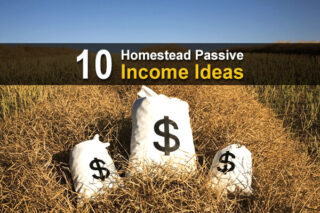Estimated reading time: 6 minutes
Do you keep putting off your dream of homesteading while you try to save up enough money to get started? With the cost of everyday living, that can be a frustrating and never-ending experience.
How would it change things if you made the decision to begin homesteading with what you already have? You can, you know. It may not look like the homestead of your dreams, but if you consider it a work in progress, you can homestead even when you're broke.
Here are eight steps to follow.
Want to save this post for later? Click Here to Pin It On Pinterest!
1. You Can Homestead Anywhere
Many of us have the picture of a few acres or more out in the country for our homesteads. We want the peace, the quiet, and the room a large piece of property offers. The trouble is, that land doesn’t come cheaply.
While you save for that larger property, you can begin a homesteading lifestyle wherever you live now – even in an apartment or a small townhome. Here are a few ideas to get you started:
- Garden in small spaces with container gardening or vertical gardening.
- Raise small livestock such as chickens and rabbits (check city regulations).
- Start a compost pile.
- Ditch the obligatory front lawn of grass and plant a garden there.
- Can or otherwise preserve whatever you don’t eat.
2. Find Homesteading Friends and Mentors
One of the great uses of the internet is how it lets us connect with like-minded people. Check out groups of homesteaders in your area and get to know them. You can be a valuable resource for each other. Not only can you share tips and techniques and provide moral support for each other, you can also trade goods and services.
Let’s say you have a bumper crop of vegetables, and they have too many chickens. You can work out a trade. Are you handy with a saw and a hammer? Trade your time and skills helping your friends build a fence and then accept their help fixing your truck. You both will save money.
Your experienced contacts also can help you find your way around local laws affecting your homestead, know what grows best on your type of soil, and answer other questions you have.
3. Learn How to be More Resourceful
It's amazing how much great stuff others are willing to give away. Many homesteaders are able to build chicken coops, fences, garden beds and other structures from wood and other supplies they obtain for free.
Be on the lookout for yard sales and regularly check sites such as Craigslist and Freecycle for items you need. Your community may have a Facebook page devoted to giveaways and inexpensive items people want to get rid of.
Get in the habit of asking friends and family if they have extra of what you need and if they would be willing to give it to you or trade you for it. Get to know your local retailers. For example, many home supply stores will sell odd or returned pieces of lumber at rock-bottom prices.
4. Look for Free or Inexpensive Livestock
For many reasons, including illness and other life changes, some people have to downsize their farms and homesteads. As a result, they may be offering their animals at low prices or even for free. Get to know the owners and then ask plenty of questions about the animal’s health and care before you take the plunge.
Also, as you are getting started, consider small livestock such as budget-friendly rabbits and quail.
5. Garden on the Cheap
No matter where you're living now, you can start growing some of your own food. Even if you live in an apartment, you can plant containers of vegetables on a porch or patio.
Learn to make the most out of the space you have with raised beds and vertical gardening. When you are on a tight budget, start with vegetables your family already eats. You can always get more adventurous later.
Seeds take longer than transplants, but they are less expensive. Be sure to buy quality seeds; they cost a bit more but they are worth it in the long run.
Another idea is to ask your new homesteading contacts for starter plants. Many experienced gardeners are happy to share strawberry plants or herbs that need thinning out in their gardens. Once again, you can check the internet for gardeners who are willing to trade plants or seeds for other items or services.
6. Make a Compost Pile
Did you know that you can save money by composting your own kitchen and yard scraps? Composting provides you with rich, healthy fertilizer that many gardeners call “black gold.”
Many communities offer free compost bins to residents. Call your local recycling or trash department to find out. You also can make your own inexpensive compost container. Here are a few resources to help:
- 23 Ingenious DIY Compost Bin Ideas
- 18 Cool DIY Compost Bin Designs
- 4 DIY Compost Bins You Can Build in One Day
7. Preserve What You Grow and Gather
We have such a throwaway culture here in the United States. Homesteaders are people who are bucking that trend, and one of the big ways is through preserving food.
You can keep more of your money in your wallet by saving your food before it goes bad through canning, dehydrating, freezing, and cold storage.
Many stores put canning supplies on sale after the late summer canning season. You also can find inexpensive supplies at yard sales. Consider sharing the cost of canning equipment with a homesteading friend and do the work together.
Here are some great ideas for canning on a budget:
- Cheap Canning Supplies
- Canning Equipment on a Budget
- Preserve Food at Home with Cheap Canning Equipment and Free Recipes
8. Learn a Frugal Lifestyle
This step is listed last, but it really is the most important. The best way to get your homestead off the ground is by changing your mindset to one of living within your means.
If you have had the opportunity to talk with someone who lived through the Great Depression, you know they have a philosophy of “use it, reuse it, wear it out or get by without it.” It’s great advice for the homesteader.
Plan a budget for your family and follow it. Don’t buy things you can’t afford and save what you have leftover each month for unplanned expenses and for big purchases. Nothing left over? Then you need to explore some ways you can make money as a homesteader including:
- selling eggs
- selling homemade products
- teaching classes
- blogging
- selling cut flowers
- working as an independent contractor ion your areas of expertise
Be creative. Your goal of living a self-sufficient lifestyle as a homesteader is within reach. However, learning to live on a strict budget is a challenge, and lack of money is the main reason people abandon their homesteading dreams.
The good news is that a frugal lifestyle gets easier as you go along. And as you progress, you will enjoy the sense of freedom, flexibility, and independence it offers. You don’t need to wait for a big financial windfall to homestead – that may never happen – but you can start building your dream wherever you are.
Like this post? Don't Forget to Pin it On Pinterest!












I have considered mulching plants and herbs to produce chemical-free veggies but I live in an apartment and mulching somehow attracts lots of biting insects. Is there a workaround this matter? Bookmarked this page and thank you for sharing great information!^Eric
I used 2 / 5 gallon buckets and took a ice pick and just put like 12 small tiny holes – when I lived in New York on the 12th floor
I live on a disability pension and I am just learning how to do some of these things that were suggested on this site.